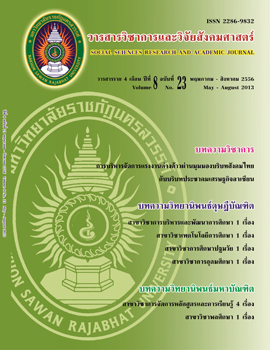การพัฒนารูปแบบการจัดการเรียนรู้แบบ 4M เพื่อส่งเสริมทักษะ การคิดเชิงเหตุผลสำหรับเด็กปฐมวัย
Main Article Content
Abstract
บทคัดย่อ
การวิจัยครั้งนี้มีวัตถุประสงค์เพื่อ 1) พัฒนารูปแบบการจัดการเรียนรู้แบบ 4M เพื่อส่งเสริมทักษะการคิดเชิงเหตุผลสำหรับเด็กปฐมวัย และ 2) ศึกษาประสิทธิผลของรูปแบบการจัดการเรียนรู้แบบ 4M โดยมีวีธีดำเนินการวิจัย 2 ขั้นตอน คือ 1) สร้างและพัฒนารูปแบบการจัดการเรียนรู้แบบ 4M โดยศึกษาและวิเคราะห์เนื้อหาเกี่ยวกับการจัดการเรียนรู้ด้านการพัฒนาสติปัญญาการคิดเชิงเหตุผล สร้างรูปแบบการจัดการเรียนรู้แบบ 4M จากนั้นประเมินรูปแบบการจัดการเรียนรู้แบบ 4M ด้วยแบบประเมินค่าความเหมาะสม 5 ระดับเป็นเครื่องมือการวิจัย กับผู้เชี่ยวชาญจำนวน 5 คน สถิติที่ใช้ในการวิเคราะห์ข้อมูลได้แก่ ค่าเฉลี่ย ค่าเบี่ยงเบนมาตรฐาน 2) การศึกษาประสิทธิผลของรูปแบบการจัดการเรียนรู้แบบ 4M โดยทำการทดลองกับกลุ่มตัวอย่างเด็กปฐมวัยจำนวน 50 คน ที่เรียนอยู่ชั้นอนุบาล 3 โรงเรียนสาธิตละอออุทิศ สังกัดมหาวิทยาลัยราชภัฏสวนดุสิต ภาคเรียนที่ 2 ปีการศึกษา 2555 ได้มาจากการสุ่มอย่างง่าย แบ่งเป็นกลุ่มทดลองใช้รูปแบบการจัดการเรียนรู้แบบ 4M จำนวน 25 คน กลุ่มควบคุมใช้การจัดการเรียนรู้แบบปกติ จำนวน 25 คน ทดสอบสมมติฐานโดยใช้สถิติ t - test for dependent samples และ t - test for independent samples จากนั้นขยายผลการใช้รูปแบบ 4M ในสภาพจริงโดยครูปฐมวัยที่สอนเด็กปฐมวัยชั้นอนุบาล 3 จำนวน 6 คน แสดงความคิดเห็นในแบบประเมินค่าความเหมาะสมของรูปแบบ วิเคราะห์ข้อมูลโดยใช้สถิติพื้นฐานค่าเฉลี่ย และ ค่าเบี่ยงเบนมาตรฐาน
ผลการวิจัยพบดังนี้
1. ผลการพัฒนารูปแบบการจัดการเรียนรู้แบบ 4M พบว่า สามารถนำไปส่งเสริมทักษะการคิดเชิงเหตุผลสำหรับเด็กปฐมวัยได้ตามความคิดเห็นของผู้เชี่ยวชาญโดยค่าดัชนีความเหมาะสมอยู่ในระดับมากและมากที่สุด ค่าเฉลี่ยตั้งแต่ 4.00-4.80
2. ผลการศึกษาประสิทธิผลของรูปแบบการจัดการเรียนรู้แบบ 4M พบว่า เด็กปฐมวัยกลุ่มทดลองมีทักษะการคิดเชิงเหตุผล หลังการทดลองสูงกว่าก่อนการทดลอง อย่างมีนัยสำคัญทางสถิติ ที่ระดับ .01 และกลุ่มทดลองมีทักษะการคิดเชิงเหตุผลสูงกว่ากลุ่มควบคุมหลังการทดลอง อย่างมีนัยสำคัญทางสถิติ ที่ระดับ .01 ด้านการขยายผลการใช้รูปแบบ 4M ไปใช้ในสภาพจริง พบว่า มีความเหมาะสมในระดับมากและมากที่สุด ค่าเฉลี่ยตั้งแต่ 4.00 - 4.67 สามารถนำไปใช้เพื่อส่งเสริมทักษะการคิดเชิงเหตุผลในเชิงปฏิบัติกับเด็กปฐมวัยได้
Abstract
This research aims to 1) develop a 4M learning model to promote young children’s reasoning thinking skills and 2) study the efficiency of the 4M learning model. The procedure of this study included 2 steps. The first step was to create and develop the 4M learning model according to the related documents on learning management of intellectual development for reasoning thinking skills. Then the form of 4M learning model was developed and approved by 5 experts using the 5- point rating scales. The data were analyzed by using mean and standard deviation. The second step was to study the efficiency of the 4M learning model with the sample of 50 preschool children studying in kindergarten 3 at La-Or Utit Demonstration School, Suan Dusit Rajabhat University, Bangkok, Thailand in the second semester of 2012 school year. The students were chosen by using simple random sampling and equally divided into two groups. One with 25 preschool children was an experimental group using the 4M learning model. The other with 25 preschool children was a controlled group using normal learning. The statistic methods used were t-test for dependent samples and t-test for independent samples, and then the 4M learning model was extended in classroom reality. Six early childhood teachers teaching in kindergarten 3 were interviewed for their comments and assessment of the 4M learning model. The data were analyzed by using mean and standard deviation.
The research findings were as follows:
1. According to the experts, the 4M learning model was appropriate for encouraging reasoning thinking skills of young children. The total scores for the appropriateness of the model were in the high and highest levels with the average of 4.00 - 4.80.
2. The result of investigating effectiveness of 4M was that in the experimental group, the post-test score was higher than the pre-test score (significant level of .01), and the score of the experimental group in terms of reasonably thinking skills was higher than those of the control group (significant level of 0.1) The 4M learning model could be adopted in the classroom reality. The model was practically appropriate for encouraging young children’s reasoning thinking skills at the high and the highest levels with the average mean of 4.00 - 4.67.


